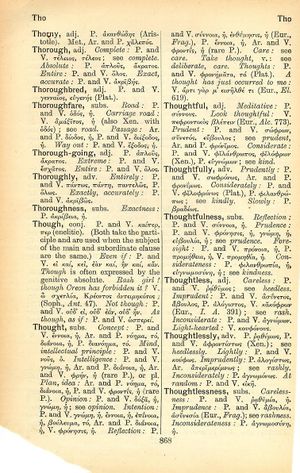though: Difference between revisions
From LSJ
Χρόνος δ' ἀμαυροῖ πάντα κεἰς λήθην ἄγει → Diesque celat omnia atque oblitterat → Die Zeit verdunkelt alles, gibt's dem Vergessen preis
(Woodhouse 5) |
(CSV5) |
||
| Line 1: | Line 1: | ||
{{ | {{Woodhouse1 | ||
| | |Text=[[File:woodhouse_868.jpg|thumb|link={{filepath:woodhouse_868.jpg}}]]'''conj.''' | ||
P. and V. [[καίπερ]], περ (enclitic). | |||
(Both take the participle and are used when the subject of the main and subordinate clause are the same.) <b class="b2">Even if</b>: P. and V. εἰ καί, κεἰ, ἐὰν καί, ἢν καί, κἄν. | |||
<b class="b2">Though</b> is often expressed by the genitive absolute. <b class="b2">Rash girl! though Creon has forbidden it?</b> V. ὦ σχετλία, Κρέοντος ἀντειρηκότος; (Soph., ''Ant.'' 47). | |||
<b class="b2">Not though</b>: P. and V. οὐδʼ εἰ, οὐδʼ ἐάν, οὐδʼ ἤν. | |||
<b class="b2">As though, as if</b>: P. and V. [[ὡσπερεί]]. | |||
}} | }} | ||
Revision as of 10:06, 21 July 2017
English > Greek (Woodhouse)
conj.
P. and V. καίπερ, περ (enclitic).
(Both take the participle and are used when the subject of the main and subordinate clause are the same.) Even if: P. and V. εἰ καί, κεἰ, ἐὰν καί, ἢν καί, κἄν.
Though is often expressed by the genitive absolute. Rash girl! though Creon has forbidden it? V. ὦ σχετλία, Κρέοντος ἀντειρηκότος; (Soph., Ant. 47).
Not though: P. and V. οὐδʼ εἰ, οὐδʼ ἐάν, οὐδʼ ἤν.
As though, as if: P. and V. ὡσπερεί.

